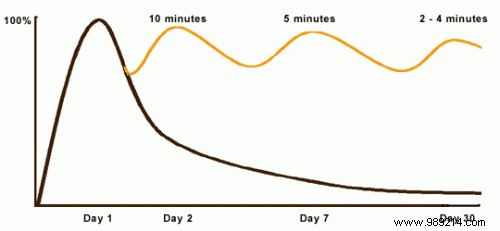Ever heard of the forgetting curve? This century-old discovery from experimental psychology reveals how we forget information exponentially—up to 50% within the first hour. But proven strategies can help combat it.
The forgetting curve illustrates the decline of memory retention over time. In 1885, German psychologist Hermann Ebbinghaus, a pioneer in experimental psychology, demonstrated its exponential nature. This concept is also detailed in research from the University of Waterloo in Canada.
Consider someone attending a one-hour conference. Before it starts, their knowledge is at 0%. Right after, retention peaks at 100%. But decline sets in fast: within the next hour to day one, they lose 50-80% of what they learned.

The drop continues, leaving just 2-3% retained after 30 days.
The good news? Active engagement can extend learning. UCLA cognitive psychologist Elizabeth Bjork emphasized in 2008 the importance of applying knowledge soon after learning—through practice, re-reading tricky sections, or explaining concepts. The brain discards unused information to make space for new inputs.
For lasting retention, embrace "encoding" through deliberate effort. One top method is spaced repetition: reviewing material at increasing intervals.
Other effective techniques include teaching others, watching hands-on demos like instructional videos, prioritizing sleep, or even taking short naps to solidify memories.